Over a decade ago, Tor gave away a free copy of Old Man’s War by John Scalzi. Little did they know how profitable that free PDF was going to be for them, over the years. I still have it, even though I have purchased copies of Old Man’s War multiple times since, and only half the reason is because I’m a digital hoarder. Yes, that’s right: I have nostalgia for a PDF file.
Old Man’s War was my first book by John Scalzi, and it would be my gateway back into science fiction and fantasy after years and years skimming along the surface, apathetic about my reading choices and not finding the type of science fiction in literary form that I loved so much in visual mediums. I’m probably not Scalzi’s biggest fan (or AM I?), but I am at least up there in the Hall of Fame with the other people who have handwritten him letters and then mailed them to friends across the country to deliver at book events I couldn’t attend.
I have tons of favorite authors, but there’s something special about finding that first author in whatever your favorite genre is that can tell a story that makes you go, “I want more of this immediately.” After reading Old Man’s War, I devoured all the work by Scalzi that I could afford to buy and then started waiting for him to publish more. He’s been a reliable source of entertainment for years—even years when he doesn’t publish new books, because he writes books that are very re-readable. Let’s not talk about how many times I’ve read The Android’s Dream and how desperately I want another book in that universe. (Unless your name is John Scalzi and you want to tell me all about your plans for the next book. Then we can talk.)
That said, I also think that Scalzi is a complicated person and author who, as he’s grown as a storyteller, has done a lot of experimenting in his fiction that might be opaque or extremely subtle to the eyes of new readers. Because I am an Extreme Scalzi Fan, I’m 100% biased about wanting people to start in certain places, learn his style as an author, and then move on to other, more experimental books. This is self-serving: I want to maximize the number of people I can convert into ways of the Scalziverse.
Wondering where to start? Well, here is a guide to some of John Scalzi’s back catalogue, by me, an Extreme Scalzi Fan:
101: Beginner Scalzi
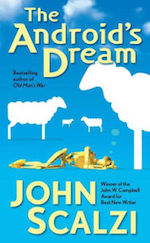 If you’re brand-new to Scalzi’s work, there a few possible starting places. If you want a comedic space opera adventure, you’ll want to start with Old Man’s War and its companion and sequel novels, The Ghost Brigades and The Last Colony. If you’re in the mood for straight up comedy SF, then Agent to the Stars is your entry point. And if you want some comedy but also kind of want to watch a political thriller in your underwear while eating snack food and don’t know what book could possibly meet all those qualifications at once, there’s The Android’s Dream, which is the funniest/darkest book about sheep I’ve ever read.
If you’re brand-new to Scalzi’s work, there a few possible starting places. If you want a comedic space opera adventure, you’ll want to start with Old Man’s War and its companion and sequel novels, The Ghost Brigades and The Last Colony. If you’re in the mood for straight up comedy SF, then Agent to the Stars is your entry point. And if you want some comedy but also kind of want to watch a political thriller in your underwear while eating snack food and don’t know what book could possibly meet all those qualifications at once, there’s The Android’s Dream, which is the funniest/darkest book about sheep I’ve ever read.
And although it’s not quite out yet, I would 100% put The Collapsing Empire here as a great gateway book, especially if you like foul-mouthed women and hipster-ish scientists saving humanity from interstellar calamity. I would call The Collapsing Empire Scalzi’s political space thriller. It’s more drama than comedy, which sets it apart from Old Man’s War, but let’s be real: it’s Scalzi, and he’s a funny guy who writes great character banter. You’re gonna laugh.
102: Intermediate Scalzi
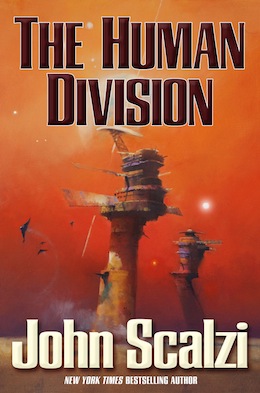 Here, I’d place the continuations to the Old Man’s War series. If you want to read a novel that revisits that world and characters, but doesn’t start a completely new series with new characters, pick up Zoe’s Tale, which retells the story in The Last Colony from an entirely different perspective. Zoe’s Tale is also one of the novels I would put in Scalzi’s experimental category, where he starts to really grow as an author. The main criticism I’ve seen this novel get generally implies that teenager girls just aren’t this clever. My clapback to that is that you must not know that many teenage girls, and also, you’re wrong. Of all the adult novels featuring young women that I read during the late 2000s, this continues to be one of my favorites.
Here, I’d place the continuations to the Old Man’s War series. If you want to read a novel that revisits that world and characters, but doesn’t start a completely new series with new characters, pick up Zoe’s Tale, which retells the story in The Last Colony from an entirely different perspective. Zoe’s Tale is also one of the novels I would put in Scalzi’s experimental category, where he starts to really grow as an author. The main criticism I’ve seen this novel get generally implies that teenager girls just aren’t this clever. My clapback to that is that you must not know that many teenage girls, and also, you’re wrong. Of all the adult novels featuring young women that I read during the late 2000s, this continues to be one of my favorites.
If you want to stay in the Old Man’s War universe but are hungry for additional adventures that are brand-new, The Human Division and its follow-up, The End of All Things, are your next stop. They get bonus points for being chopped into easily digestible chapters, so if you want something that you can read in bits—something you can put down and easily come back to—these books are it. They were released serially, similar to TV episodes, and they work great in that format, too. But I also think they have more emotional impact when grounded in knowledge of the original series, so my preference is to recommend them after people have read (and hopefully liked—no pressure!) Old Man’s War.
103: Advanced Scalzi
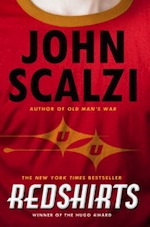 This heading is, admittedly, misleading; I don’t think these titles are inaccessible for new readers at all, and in many cases could be great entry points which would leave the books massively re-readable later on. But I do believe that these books are more experimental and that readers will benefit from being familiar with Scalzi’s style and the politics of his work (which will become clear if you read entries in the 101 and 102 categories first). It’s safe to say that depending on how deeply you read into his books, technically these titles would also work just fine in the 101 section. Since I am a big fan of deep dives into literature, though, I enjoy these books for their subtlety, their undertones, and sometimes, their sneakiness, which I think becomes easier to see and appreciate when you’re more familiar with Scalzi’s narrative habits.
This heading is, admittedly, misleading; I don’t think these titles are inaccessible for new readers at all, and in many cases could be great entry points which would leave the books massively re-readable later on. But I do believe that these books are more experimental and that readers will benefit from being familiar with Scalzi’s style and the politics of his work (which will become clear if you read entries in the 101 and 102 categories first). It’s safe to say that depending on how deeply you read into his books, technically these titles would also work just fine in the 101 section. Since I am a big fan of deep dives into literature, though, I enjoy these books for their subtlety, their undertones, and sometimes, their sneakiness, which I think becomes easier to see and appreciate when you’re more familiar with Scalzi’s narrative habits.
Redshirts is first on this list, and operates best if you have a working knowledge of Star Trek and/or any number of later, badly-written, SFF-related TV series (like, if you wasted years of your life watching Supernatural, for instance, only to be betrayed…not that I’m bitter). It works on a storytelling level if you have that background as a fan, but there are a lot of interesting undertones to the story that you’ll be able to catch if you’ve read Scalzi’s other work first.
Lock In is a fascinating book, and (without getting into spoiler territory) there’s an interesting facet of the novel that might not be immediately noticeable unless you read with a particular mindset—or if your first encounter with the story is via the audiobook. It’s a futuristic political thriller, but it’s also a narrative about disability. Plus, it challenges reader assumptions. So while I know this would work well in the 101 section based on its story alone, I again think that going into it with a firm understanding of Scalzi’s previous work enriches the reading of Lock In.
Extra Credit
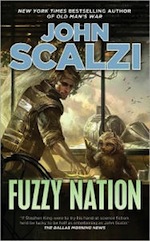 Fuzzy Nation is to H. Beam Piper’s Little Fuzzy as the Star Trek reboots are to the original Star Trek. It’s a book that could go in the Advanced Scalzi section, but it’s also so much its own thing that it feels sort of weird to lump it into any specific category. It’s a science fiction adventure novel that builds on long-existing characters and worldbuilding by another author, so really, Fuzzy Nation can be read at any point for a solid introduction to Scalzi’s narrative style.
Fuzzy Nation is to H. Beam Piper’s Little Fuzzy as the Star Trek reboots are to the original Star Trek. It’s a book that could go in the Advanced Scalzi section, but it’s also so much its own thing that it feels sort of weird to lump it into any specific category. It’s a science fiction adventure novel that builds on long-existing characters and worldbuilding by another author, so really, Fuzzy Nation can be read at any point for a solid introduction to Scalzi’s narrative style.
Obviously, this list doesn’t even cover most of John Scalzi’s work; he’s done audio-first work with The Dispatcher, he’s published a lot of extra content to existing series, plenty of nonfiction, as well as standalone work with Subterranean Press, such as his recently released Miniatures. His back catalogue is expansive and rich, and if you like science fiction, there’s a good chance he’s done something you might like if you enjoy anything from the selections above.
Of course, my arbitrary classifications are mine alone—they’re how I approach the process of introducing Scalzi’s work to my friends and acquaintances (calibrated to achieve Maximum Conversion, always!). You may have a different approach—what was the first book by Scalzi you read? Would you start by recommending that book to someone new to Scalzi or SF, or would you go with a different one? Let us know your suggested reading order for Scalzi’s ever-growing body of work!
Renay Williams stumbled into online fandom, fanfiction, and media criticism via Sailor Moon in 1994. Since then, she’s become an editor at Lady Business and a co-host of Fangirl Happy Hour. She can be found having emotions over the lives of fictional characters on Twitter @renay.










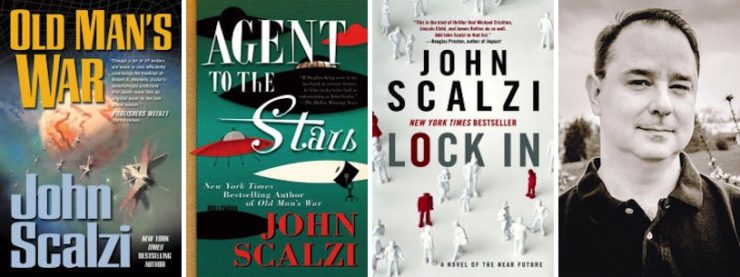
My first Scalzi was Redshirts — the Trekkie in me couldn’t resist the title. Loved it so much that I bought Lock In next, reading the wonderful prequel ‘Unlocked:An Oral History of Haden’s Syndrome’ beforehand. Those three works have really stuck with me in the time since I’ve read them. They were a good intro to Mr Scalzi’s writing, without having to commit to reading a series. In the years since, I’ve picked up several more of his books — but my favorites with forever be the two novels (and novella) that introduced me to the unique worlds of John Scalzi.
Not Fuzzy Nation please! I find it OK-ish to not-great as a stand alone book, and I it’s so different from Piper’s Fuzzy-verse that I’d hate to see the Scalzi version turn someone off from the original stories.
I like most other Scalzi that I’ve read but I always wonder what’s up with the “foreign mind taking over another body” motif he’s got going.
A fine post, though I think you overstate comedy. Scalzi puts some humor into his books, but I don’t think they aren’t intended to be comedicly funny in the way of the Marx Brothers or Three Stooges. That’s comedy, Scalzi does some humor. The OLD MAN’S WAR novels have some moments of humor, but they are, basically, straight-forward space opera and very fine examples of it.
REDSHIRTS, yes very funny, lots of humor.
LOCK IN is a science fiction mystery novel. I can’t quite see it as a “thriller”.
When you call Old Man’s War “comedy”, do you mean in the classical sense (that they don’t end badly) or in the more contemporary sense? I think they meet classical criteria, but not the laugh-out-loud-all-the-time kind. I do think Scalzi has a great sense of humour, lots of it in the series, does that make it comedy
I’m not sure why you call Old Man’s War “comedic”–that seems to suggest, to me, that it is something it is not. Some of it even seems rather grim to me, given the overall context! But I enjoyed your little overview anyways, so thanks!
I started with Redshirts. I was pretty meh on it until the codas. After The Android’s Dream also fell flat for me, I realized straight Scalzi humor doesn’t work for me.
I did enjoy the Old Man’s War series and Fuzzy Nation.
This list is more or less the opposite of what I did – I started with Lock In, followed by Redshirts and Fuzzy Nation, all of which I enjoyed. Much later I finally got around to Old Man’s War and was severely disappointed.
I never really got past his blog.
His essay on Being Poor is still the number one thing he has written, although White Male: The Lowest Difficulty Setting is also pretty darn good.
I came to his writing when he was an angry young(ish) man during the Bush II era, and it is his political ranty anger that I like the best. He still leans a little conservative for my tastes at times though.
If you are familiar with the Old Man’s War universe, “The Sagan Diary” is more advanced. He was quite experimental: often lyrical & poetic. After I went all fanboy about it at a book signing, he told me that was originally written as blank verse.
Dude, read them all. This guy’s the best thing going right now and I’ve been waiting with baited breath for a new series. So far, Collapsing Empire looks like it’s going to be an amazing one. Scalzi is constantly reinventing; breaking the genre and putting it back together better than ever. The only other author I can think of that puts as much delight into his work is Ruddy Rucker.
I discovered John Scalzi through a link to his blog where he was shredding sci-fi sexists. I read Whatever for many years until one day I was at a bookstore on my birthday and saw OLD MAN’S WAR on the shelf. I asked to get it as a present. Then my dad read it, my brother read it, my mom read it, my cousin read it, and so on and so forth. Everyone liked it and my mom bought the sequels unprompted by me. This meant I didn’t get first crack at them, so I actually read ZOE’S TALE before THE LAST COLONY and THE GHOST BRIGADES last. I hope to read REDSHIRTS soon, I know the library has it.
I came to Scalzi through the Tor “first line” game that is played periodically. Every single time the game is played someone dropped the first line from Old Man’s War and it intrigued, so I sought it out. That led to the follow up books, Redshirts, Agent to the Starts, Fuzzy Nation, Lock In, etc.
I’d offer a shout out to the After the Coup short story here on the Tor.com website. Very characteristically Scalzi and very wry and amusing. Nice gateway drug for those who want a quick taste of the Old Man’s War universe and his writing style.
The first book I’ve read by Scalzi was Old Man’s War. It’s also the book I’ve read, reread, listened to, and reread again the most times. I love the whole universe but reading Old Man’s War is like coming home. The new Collapsing Empire book is great and I think it’s going to be an outstanding series. Little Fuzzy holds a special place for me. It is so funny and light-hearted, and then when you’re not expecting it, just grabs you and squeezes your emotions. I’ve read and listened to that one multiple times as well.
My first Scalzi was Redshirts. I had read that it was a great send up of Star Trek (of which I am a huge fan), so I gave it a try and loved it. I recently finished Grad school and was able to start reading consistently again and one of the first books I read was Old Man’s War. Again, I loved it. I find his writing style to be easily readable, but his books still complex (in a good way). I’m not always crazy about his politics, but I love a free thinker, so I role with it.
I agree with the others that calling the OMW sequence comedic is badly misleading. Yes, his characters have some wit and engage in a certain amount of snark, but much of that material is pretty dark underneath.
What should I read next if I accidentally started with Fuzzy Nation? To vincentient’s concern, I kind of wanted to read the original after reading it, but haven’t done it yet.
I started with Old Man’s War and immediately read the rest of the series. Always been a fan of space opera and really enjoyed Scalzi’s take on it. Long time trekkie so had to read Redshirts and really enjoyed it. Read Lock In when released and found that to be a great book and very original.
I believe I have read all his work to date and really enjoyed them. I am currently reading the first book in The Collapsing Empire and it looks to be another great series.
I was also surprised to see you did not list The Sagan Diary as an advanced story. I felt he really stretched himself in that one and it stands as one of my favorites.
@16 Lily Go ahead and read the Piper Fuzzy stories; I think you can enjoy them. Re-reading my comment I see I was unclear. It’s not that Fuzzy Nation is in a different setting/universe and if you liked the Fuzzies as creatures or protagonists you will probably still like the original stories. But what Scalzi has done is reboot and modernize the basic story so it loses the Golden Age-ness of the original (for good and bad).
Also keep in mind that there have already been plenty of extensions to the Fuzzy-verse that were not written by Piper himself.
I immensely enjoyed Old Man’s War, though lamentably, I haven’t had the funds to purchase any more of his novels set in that universe. I obtained my copy via the Tor ebook of the month club last year, thanks by the way for that to any Tor people reading this if applicable. I admit to missing some of the humor the 1st read through, but caught it the 2nd time I read it. I tend to read books more to enjoy them then to analyze, but I do notice these things usually (though a good story and quality writing is by far the more valuable experience for my dollars). Scalzi delivers these insight as well, so it’s a bonus. I highly recommend those who haven’t read any of his work to do so, I’m sure the results will appeal.
I discovered Scalzi through his work as an editor first. My first encounter was through the METAtropolis series, which was a shared universe anthology series for which he edited (Book 1) and wrote short stories. It was first released as an audio series on Audible before it was available in limited run print. It was due to his short story in that series that I went Scalzi crazy and found the Old Man’s War series and, eventually, Lock In and Red Shirts.
I actually do find the Old Man’s War series comedic, but I think that is because I have the same sense of humor as John Perry and Harry Wilson.
Android’s Dream was the first Scalzi I read, and I picked it up because of the obvious reference to PKD’s Do Androids Dream of Electric Sheep. The cover design featured a really clever use of fluffy white sheep on a sky-blue background, and this appealed to my sense of humor. Old Man’s War was next, and then I sought out his blog, which I’ve read every day for years. Have read almost everything else he’s written (except The God Engines, which is too dark for my taste). Scalzi’s sense of humor is on display in much of his work, although I wouldn’t call his work “comedic” (even though his 2011 April Fool’s offering is one of the funniest things I’ve ever read: “The Shadow War of the Night Dragons, Book One: The Dead City“). Definitely my favorite living SF author.
I started with The Android’s Dream, then the Old Man’s War series (first 3) and just finished Fuzzy Nation. Loved them all!! I have an hour commute each way so have been perfect Audio Books. Particular the one’s narrated by Wil Wheaton :)
I have say thus far, my favorite is Fuzzy Nation followed by Android’s Dream and then the Old Man’s series. But, as I said love them all. .both the story and his style.
Next on my list is Redshirts, The Collapsing Empire and then more of the Old Man’s world.